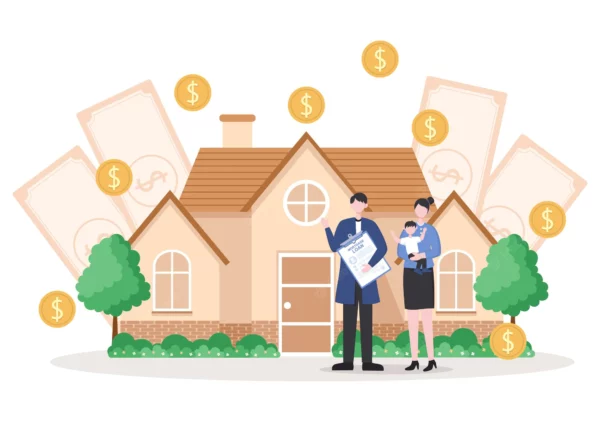How to Buy a Home Without a Mortgage

Do you have any interest in purchasing your own home? The purchase of a home is both a significant decision and a significant financial commitment. For first-time buyers, it can be difficult to qualify for a mortgage from a traditional lender if they haven't saved enough money for a down payment or if their credit score is too low. However, there are alternative financing options that may be available to first-time buyers. There are programs available for first-time home buyers that are made available by the government as well as by certain banks; however, these programs still have limitations, such as credit requirements and income limits. You are fortunate in that you have alternative choices.
Four Ways to Buy a Home Without a Mortgage

Here are four alternative ways to purchase a house without using a conventional mortgage, in case you are unable to qualify for standard mortgage financing or are just interested in learning more about your alternatives.
1. Lease Purchase
If you are unable to save for a down payment or your credit score prevents you from receiving mortgage financing, renting to own may be an excellent option. A rent-to-own property may sell more quickly in a sluggish market while still providing the owner with the advantages of owning a rental property, such as increased income and tax breaks.
In a rent-to-own agreement, you provide the owner an option deposit in exchange for the right, after a certain amount of time (often one to three years), as specified in your contract, of renting the house. If you opt to buy the house at the end of the lease period, the owner will save a part of your monthly rent and put it toward the purchase.
The biggest advantage of a rent-to-own arrangement is that you'll have time to improve your credit rating without feeling like you're wasting your money on rent. Your option deposit and rent credits will add up to a sizable amount that you may use as a down payment if you decide to buy the home.
2. Get owner financing
On rare occasions, the owner could agree to sell straight to you. This implies that instead of paying a bank on a regular basis for your mortgage, the seller will fund your purchase.
The seller and the buyer should draft a Real Estate Purchase Agreement to expedite the sale and specify the terms of payment as all real estate transactions should be recorded in writing. The seller will often hold off on transferring the property title until after you've completed your last payment, at which time they may utilize a Warranty Deed to legally transfer ownership.
Finding a seller who is willing to participate in this sort of agreement might be difficult, but those who have fully paid off their mortgage and don't want the proceeds of the sale right away may be more receptive.
3. Obtain a Personal Loan
Your chances of success with an investment lender or a peer-to-peer lender may be improved if your credit score is too low to qualify for a conventional mortgage. Private lenders may not be as risk-averse as banks, but you should still be aware that they will probably charge you a higher interest rate (12–20%) to cover the extra risk of lending to you.
If at all feasible, borrowing money from a relative or acquaintance is preferable. Even though it might be unpleasant to do so, private house loans can be advantageous for both of you. Your family member may be able to make more money off of your loan than with other sorts of investments, even though you will probably be able to negotiate more flexible payment terms and a cheaper interest rate with them than with a bank.
Even if you and the lender are close friends and have a high level of confidence in one another, it's still crucial to treat this agreement like a commercial transaction and safeguard your interests with a formal contract. The details of the loan, such as the frequency, amount, and length of time you have to return the money, should be laid down in a Promissory Note.
In order to secure the loan, the lender needs also to create a mortgage agreement (sometimes known as a deed of trust, depending on your jurisdiction). If you don't pay back the loan, the lien provides the lender the ability to foreclose on the property. The lien is released after the debt has been repaid.
4. Pay in Cash

The last and most straightforward alternative is to pay cash for your house. Long-term expenditures, such as closing charges and loan interest, might be reduced by paying cash for the item you want to buy. Even better, you may take pleasure in being debt-free and free of the strain of regular mortgage payments.
The seller may benefit from a cash buy as well, especially if they need to sell their property quickly and there is a bidding battle. They won't have to worry about the buyer pulling out of the deal because they can't get financing if they accept a cash offer.
Saving money for a cash purchase is obviously easier said than done, and you definitely don't want to spend all of your resources on a property upfront at the risk of future financial difficulties. You will need to start an ambitious savings strategy or take into account one of the aforementioned possibilities unless you have just experienced a windfall or have already accumulated sizable money.
Can you buy house cash without proof of income?
You also have the option of purchasing real estate with cash, in which case you won't be required to give any documentation of your income. To restate, there is no legislation that prevents you from purchasing a home with cash at any time. If you already have sufficient monies in your possession to pay the initial cost of the transaction, you will not be asked to present any documentation of your income in order to proceed with the transaction.
Buy a house at an auction
An excellent option for purchasing a home at a lower price or without the need for a mortgage entirely is to do it via the medium of a real estate auction. After a property has been foreclosed on, it will often be sold at an auction. This might indicate one of two things: either the previous owner did not pay their property taxes over a period of time or they simply defaulted on their mortgage payments.
After a house has been seized by the lender, it may be put up for auction using one of three methods: an absolute auction, a minimum auction, or a reserve auction. An absolute auction gives bidders greater flexibility to bid below the home's value; a minimum bid auction starts at higher prices, and a reserve auction is more like standard homebuying in that it gives the lender the chance to reject lower offers. All three types of auctions allow bidders to compete for the property; absolute auctions give bidders greater flexibility to bid below the home's value; minimum bid auction When acquiring a home via an auction, it is imperative that you take into consideration the possibility that you will not be able to see the property before placing a bid or that you will end up buying a home that is in poor shape.
Buying a house outright with cash
You won't have to worry about paying any interest on the loan or any closing charges if you acquire a piece of real estate with cash instead of using a loan. There are no fees that lenders charge purchasers to evaluate them for mortgage origination, appraisal, or any other expenses, according to Robert Semrad, JD, senior partner and founder of DebtStoppers Bankruptcy Law Firm, which is located in Chicago. The firm is known as DebtStoppers Bankruptcy Law Firm. Chicago is home to the organization's main office.
Can I buy a house in the USA without a mortgage?
The very last option, which also happens to be the one that makes the most sense, is to acquire your home with cash alone. It is conceivable that whatever it is that you want to buy in the long run may end up costing you less money overall if you pay for it with cash instead of using a credit card or another form of payment. When you take into consideration the fees that are related to the closing as well as the interest payments that are due on your loan, you will see that this is particularly true.
Even better, because you won't have any debt, you won't have to worry about making payments on your mortgage or any other responsibilities that are due on a monthly basis, including any other payments that might be required. You won't have to worry about any of these things because you won't have any debt.
Do you need a mortgage?
If you are unable to pay the whole cost of a piece of real estate with cash up front, you will be required to get a mortgage in order to cover the remaining balance. Even if you have enough money saved up to buy a house outright and do not need any form of loan, there are circumstances in which obtaining a mortgage may be the most financially responsible option to make. For example, in order to free up capital that may then be invested in other enterprises, investors would often take out mortgages on properties that they already own in order to finance the payments on those mortgages.
People Also Ask
1. Is it better to take a home loan or pay cash?
If you can't get a loan or credit card with a low-interest rate, paying in cash might help you avoid paying a lot of interest. You're not the greatest at following a budget. Those who often overspend, forget to pay their bills, or simply make the minimum payment each month may be better to stick to cash.
2. Can you pay for a house in full?
A cash buyer is someone who pays the whole purchase price of the house with their own money, without taking out a loan. With a quicker closing than with a mortgage loan, buying a property "with cash" might benefit both the buyer and the seller.
3. What age is the best to buy a house?
The best time to purchase your first house is between the ages of 25 and 34. The equity in your house will be even more crucial to your financial stability as you approach your golden years and (hopefully) retirement, particularly if you need to remortgage to fill any gaps in your retirement plans.
FAQs
1. Do you need a mortgage?
If you are unable to cover the whole cost of a property out of pocket, a mortgage is required. Even when you have the funds to pay off your mortgage, there are certain situations where it makes sense to have a mortgage on your house.
2. How do I not get a mortgage?
lease option. If you are unable to save for a down payment or your credit score prevents you from receiving mortgage financing, renting to own may be an excellent option. Purchase Owner Financing. On rare occasions, the owner could agree to sell straight to you.
3. What percentage of homeowners have no mortgage?
A little over half (47.9 percent, to be precise) of all owner-occupied houses are free of mortgage debt.
Summary
Obtaining a home loan may be a challenging endeavor. And depending on how much you make, it's possible that this won't be enough to purchase a house. We have thus posed the question to Wayhome, asking them to describe their program for purchasing a home without taking out a mortgage.
https://paypant.com/how-to-buy-a-home-without-a-mortgage/
Comments
Post a Comment